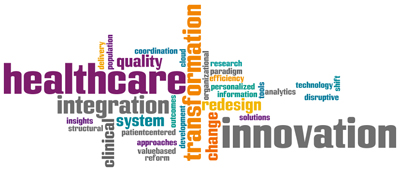

I was watching a commercial for a new show called Pure Genius, which is basically about a new hospital founded by a tech genius and a veteran surgeon that uses technology to offer a “new school” approach to medicine, and started to think about the technology that we use in healthcare. It seems that we learn about the advances in medicine on almost a daily basis and often hear about new discoveries.
For example, back in 2013, Boston Children’s Hospital found the root cause of type 1 diabetes and is currently working on a cure. A cure for type 1 diabetes could affect 215,000 people in the U.S. under the age of 20 who have type 1 or type 2 diabetes. This is an amazing discovery that could literally improve the lives of thousands of young people and their families. Instead of producing treatments to balance blood sugar and insulin, a cure could be produced.
I previously discussed 3D printing and how it has brought more innovation to healthcare and is being used to do amazing things, such as making possible the creation of an exoskeleton to help paralyzed people walk, creating hearts modeled after patients that allow surgeons to practice prior to the actual procedure, and creating cells to be used for research thus reducing the need for stem cells. Printing, which for a long time was simply a tool used to create and make copies of documents is now used to create cells and organs and help people walk.

Within the last 10 years, some major advances in medicine were made that have led to better treatments and have brought us closer to cures. One such discovery, made back in 2011 by researchers at Northwestern University, has allowed them to find the common cause behind the mysterious and deadly affliction of Amyotrophic Lateral Sclerosis, (ALS) – or Lou Gehrig’s disease. This discovery provides an opening to finding treatments for ALS and could lead the way to treatments for other, more common neurodegenerative diseases such as Alzheimer’s, dementia and Parkinson’s
Another 2011 discovery has brought hope to the more than 1.2 million people in the United States that are afflicted with Human Immunodeficiency Virus, (HIV). Researchers led by scientists at Imperial College London and Johns Hopkins University have found a way to prevent HIV from damaging the immune system by removing cholesterol from the virus’s membrane. This supports the idea that HIV overstimulates the innate response and that this weakens the immune system. Researchers believe that this discovery along with the continued advances that have come from it will lead to an eventual cure.

In 2015, researchers have found what may be a permanent cure for Duchenne Muscular Dystrophy, a disabling and eventually fatal genetic condition that affects approximately one in 5,000 boys worldwide. Investigators used a harmless virus to carry gene editing components into the affected muscles.
Some exciting developments that are expected to impact healthcare in the near future include the ability to measure blood glucose levels by our tears using a digital contact lens patented by Google. The Microsoft Hololens is a product that will help move medicine and treatments forward by projecting digital information onto what we are seeing. (It’s not all about producing computers anymore). The intelligent surgical knife, (iKnife), developed by Zoltan Takats of Imperial College London, uses an old technology where an electrical current heats tissue to make incisions with minimal blood loss. With the iKnife, the vaporized smoke is analyzed by a mass spectrometer to detect chemicals in the sample. This allows the knife to identify a malignant tissue in real-time.

Of course healthcare advances aren’t limited to the body. One of the biggest topics of discussion has been how to make healthcare more efficient, which both increases safety and reduces cost. One way is for more sharing of patient information amongst the healthcare industry. One concern has always been how to balance the new innovations with the privacy rights of the patient, (the protection of their Protected Healthcare Information, or PHI). One solution is “Referral MD,” which provides Health Insurance Portability and Accountability Act, (HIPAA), compliant communication with clinical decision support for expedited physician to physician e-consults and referrals. Many states are also in the process of creating systems that will allow healthcare providers to share PHI and other patient health information. The hope is to eventually have the ability to share this information on a national level.
The ability of healthcare providers to share information is a major step in allowing them to be more informed and provide better, more effective treatments to their patients. It also better equips patients to be involved in their healthcare. Recently, the federal Department of Health and Human Services, (HHS), released a video to inform patients of their right to access their electronic healthcare information, which is used as part of their overall health care and treatment plans.
Continued advances in healthcare and health information delivery will create a more efficient and safer healthcare system, will lower costs, and will allow people to live healthier, happier lives.
 Born in Nashua, Brian Chicoine spent his early years in Raymond before moving to Manchester at the age of 9. A few years after graduating from West High School, Brian moved to Providence to complete his undergraduate degree at Rhode Island College. After college Brian got married then he and his new wife Jackie spent a little more than five years in New Hampshire, where their two boys were born. The Chicoine family then returned to Jackie’s home state of Rhode Island and have been living there since. Brian has merged his passion for entrepreneurship and innovation with his love of new and bold ideas to bring fresh perspectives on the way things are done. Brian, Jackie, and their two boys currently live in Rhode Island, but their hearts are in New Hampshire.
Born in Nashua, Brian Chicoine spent his early years in Raymond before moving to Manchester at the age of 9. A few years after graduating from West High School, Brian moved to Providence to complete his undergraduate degree at Rhode Island College. After college Brian got married then he and his new wife Jackie spent a little more than five years in New Hampshire, where their two boys were born. The Chicoine family then returned to Jackie’s home state of Rhode Island and have been living there since. Brian has merged his passion for entrepreneurship and innovation with his love of new and bold ideas to bring fresh perspectives on the way things are done. Brian, Jackie, and their two boys currently live in Rhode Island, but their hearts are in New Hampshire.
⇒ Check out the Forward Focus archives here.
 You’re one click away! Sign up for our free eNewsletter and never miss another thing.
You’re one click away! Sign up for our free eNewsletter and never miss another thing.







